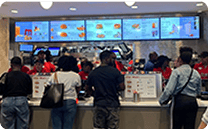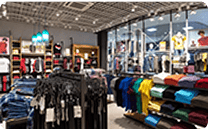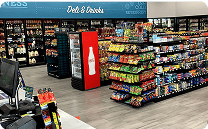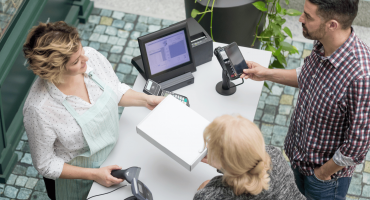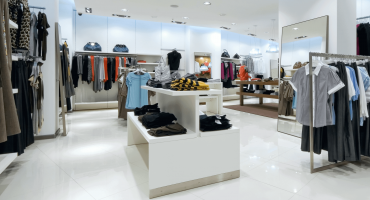In This article
Executives of department stores are scratching their heads about how to compete with the rise of specialty retail stores. Focusing on personalized shopping experiences and specific product categories, these retailers are giving shoppers a reason to choose them over big-box alternatives.
In this guide, DTiQ discusses the specialty retail market and what business owners need to know about today’s industry.
Understanding the Specialty Retail Market
First, what is specialty retail, and does your business fall under this umbrella? These stores and e-commerce brands have a very specific focus, catering to niche markets. They typically carry a limited inventory featuring carefully curated collections of high-quality items.
Sustainably sourced, handcrafted, and locally made products are often the stars of the show, but specialty retail, in general, is a consumer destination for unique, long-lasting, attractive items. Sporting goods stores, bookstores, florists, furniture stores, and office supply stores are all considered specialty retail stores. Examples include:
- Home Depot
- Best Buy
- Barnes & Noble
- Ulta Beauty, Inc.
- At Home
- Williams-Sonoma
The American specialty retail industry has sustained steady growth, projected to soar to USD 442725.74 billion by 2031. This is largely because of the way COVID-19 shifted consumer spending habits and preferences. However, the desire for individualized shopping experiences and a need for certain products and services has also contributed to the industry’s increasing value.
Some of the major trends and consumer preferences that specialty retailers can expect to implement into their planning include:
- Increasing availability of credit options
- The increasing rate of urbanization and its effects on the industry
- Higher frequency of ecommerce purchases compared to brick-and-mortar
- Heightened competition with international brands, especially China and India
- Prioritizing investments in specialty retail technology, research, and development
- Demand in certain sectors, such as home improvement, motorcycles, and bicycles
Sourcing Products and Inventory Management
No matter the retail specialty, businesses need reliable supply chain partners to keep their inventories stocked and profits growing. This is vital for keeping up with department retail stores, which have established relationships with suppliers and vendors. Plus, gaps in inventory availability can affect how the consumer perceives the specialty retailer, potentially influencing them to shop elsewhere.
Aside from ensuring dependability with suppliers and vendors, product quality and variety are just as important. Goods and services should always be consistent in appearance, packaging, quality, and other features. Inconsistent quality can position the specialty retailer in the wrong light, and consumers who assume cheap quality are likely to stop giving that store business.
Luckily, specialty retailers don’t have to fight this battle alone. By implementing efficient inventory management systems and other loss prevention solutions, businesses can put safeguards in place to protect their bottom lines.
Inventory Challenges
The COVID-19 pandemic sent shockwaves through the specialty retail sector, exacerbating inventory challenges. Supply chain disruptions became more frequent and severe, with global lockdowns and restrictions disrupting production and transportation.
Sourcing products effectively to maintain product inventory and quality is more important than ever.
Staffing and Training
Just as inventory must always be reliable, the same can be said for specialty retail staff. During the hiring process, stores need to define staffing requirements based on their niche market and offerings. Recruiting and hiring knowledgeable, passionate employees is the gateway to offering the personalized shopping experience consumers desire.
Even if they hire an expert, specialty retailers should provide thorough training for each employee to ensure exceptional, seamless customer service. These training sessions should cover areas such as:
Product and Service Knowledge
High-quality specialty goods and services must be matched with extremely knowledgeable staff members, who know offerings inside and out. Training should cover every detail and selling point for each product in stock or service offered. Companies can always offer in-depth training, but it also helps to hire individuals with prior retail experience, strong attention to detail, and excellent communication skills.
Generating a Pleasant Atmosphere
From welcoming and greeting customers to keeping the space clean, providing a pleasant atmosphere in a specialty retail space is one of the best ways to encourage repeat business. From an interior design perspective, the physical storefront should feel more intimate and cozy than a big-box store with aisles of items and with a select few employees. When it comes to interacting with customers, product expertise, friendliness, respect, and honesty should always be top of mind.
How to Personalize Customer Service
It can be as simple as remembering a repeat customer’s name, products they like, and what they’ve purchased in the past. Specialty retailers can also utilize marketing technology to create memberships, and reward programs, to encourage repeat customers. This data can also be used to analyze consumer behavior to find strengths and weaknesses in customer service. Whatever the approach, personalizing the customer experience begins with each employee and the interactions they have with every consumer.
Pricing Strategies and Profitability
In specialty retail, the market will always be unpredictable, even if trends look promising for the near future. The COVID-19 pandemic is a great example –– when in-person shopping was discouraged, ecommerce statistics skyrocketed in the United States and around the world. However, the pandemic recovery period is indicating an uptick in brick-and-mortar shopping, so the COVID-19 boom could prove to be a once-in-a-lifetime opportunity.
Of course, a global pandemic doesn’t happen every day, so businesses must also consider factors like the state of the economy, seasonal slow periods, and wholesale cost increases. The key to weathering any market trend is setting competitive pricing while maintaining profitability. By understanding pricing models and strategies, specialty retail stores can manage discounts, promotions, and sales effectively.
Customer Experience and Relationship Management
Personalizing the customer experience is a process that never truly ends. Specialty retailers must always be enhancing the in-store experience for customers. If online purchases can also be made, businesses need to ensure a coordinated front across all customer touchpoints.
By continuing to improve the way consumers interact with the brand, specialty retailers can make headway in developing meaningful relationships with every customer. Some common best practices for customer relationship management and experience enhancement include:
- Implementing a loyalty program
- Making interior design and display upgrades
- Offering workshops, lessons, showcases, and special events
- Collecting customer feedback and leveraging it to improve operations
- Providing ongoing training for employees, as customers depend on them for their product and service knowledge
- Implementing beacon technology such as interactive displays, personalized offers, self-checkout systems, mobile payment options, and augmented reality experiences
Optimizing Your Systems and Operations
First and foremost, ensure your business protects the precious data of your operation and customers. Implement secure, effective point-of-sale (POS) systems, which automate many tasks and free up staff to dedicate time elsewhere. Other ways to optimize your business could include:
- Update your cameras and surveillance systems
- Use smarter software to schedule efficiently
- Regularly review operational processes to see what works and what doesn’t
Handling Change and Future Planning
Specialty retail is always subject to impacts from changing market conditions, varying consumer needs, and other trends. By staying up to date with evolving consumer preferences, businesses can incorporate new products and adjust their niche (if necessary). Furthermore, specialty stores should also embrace technology and innovation to stay competitive, now and in the future.
When focusing on long-term growth and expansion opportunities, such as multiple store locations, develop a growth strategy and a timeline. The goal is to scale your operations to the desired size while maintaining consistent quality and customer experience.
How to Stay Ahead of Industry Trends
In the fast-paced world of specialty retail, staying ahead of industry trends and technology is paramount for sustainable success. With changing consumer preferences, emerging technologies, and evolving market dynamics, specialty retailers must be proactive and agile in their strategies.
- Stay updated on emerging trends by conducting ongoing market research.
- Monitor competitor strategies and customer preferences to identify shifts in the market.
Data Analytics
- Utilize data analytics to gain insights into customer behavior, preferences, and purchasing patterns.
- Leverage data-driven decision-making for inventory management and marketing strategies.
Training and Development
- Invest in ongoing training for your staff to keep them updated on industry trends and technology.
- Encourage a culture of innovation and adaptability within your organization.
Learn More About DTiQ’s Solutions
All in all, a sound specialty retail strategy focuses on loss prevention. Marketing plans should also consider the perceived disadvantages of specialty stores, from a smaller product variety to less convenience for consumers used to department stores. Specialty retail stores, whether brick-and-mortar or online, can gain trusted assistance when opting for custom solutions from DTiQ.
With experience implementing over 45,000 retail business intelligence platforms, DTiQ’s main goal is to help retailers transition to a smarter, more efficient operation. These solutions give specialty retail operators the ability to monitor their business from anywhere, thanks to an integrated mobile app. All clients are backed up by 24/7 customer support from DTiQ.
Capabilities of a customized DTiQ solution include features such as:
- Easy access to data analytics with:
- ~Conversion rates
- ~Customer demographics and data
- ~Detailed transaction information
- ~Dwell times
- ~Employee engagement statistics
- ~Guest experience and satisfaction feedback
- ~Location performance data and areas for improvement
- ~Loss prevention
- ~Pathing
- Intelligent video systems that:
- ~Detect suspicious activity
- ~Prevent theft
- Ability to identify staff training needs
Specialty Retail Guide Conclusion
Throughout this comprehensive guide, we’ve delved into the intricacies of specialty retail, from understanding your niche market to optimizing operations and leveraging technology. As owners and operators, you now possess a holistic understanding of what it takes to thrive in this industry.
At DTiQ, we specialize in empowering specialty retail operations with cutting-edge performance solutions. To see how we can help your business thrive, book a demo with us today and explore the possibilities of taking your specialty retail venture to new heights.






